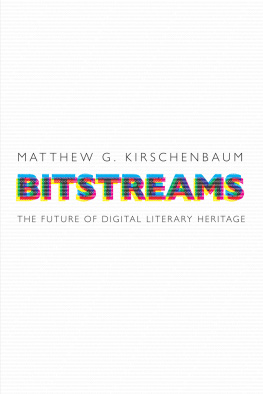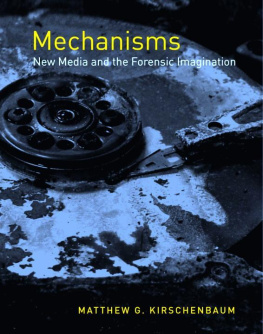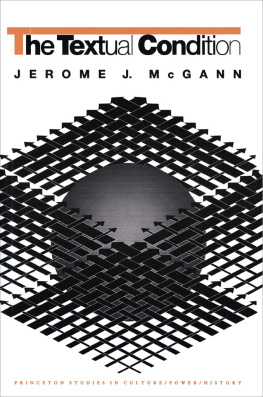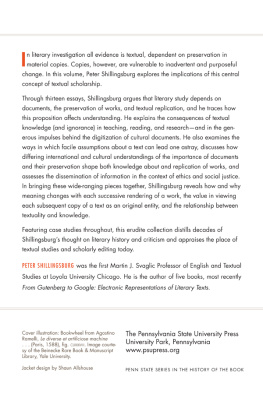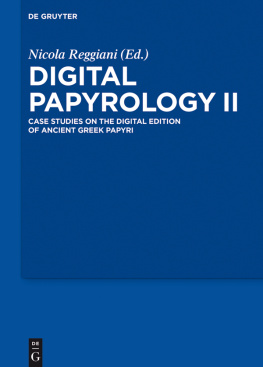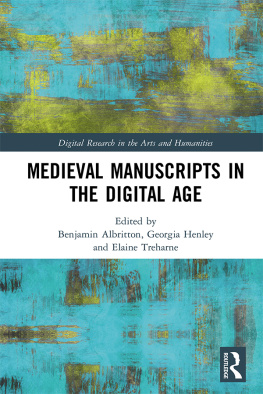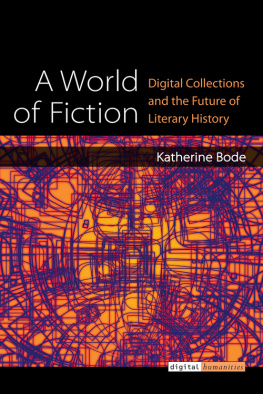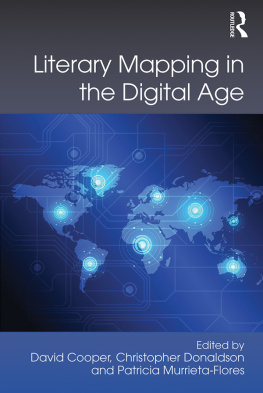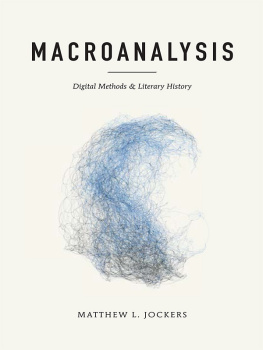Contents
Page List
Guide
BITSTREAMS
MATERIAL TEXTS
Series Editors
Roger Chartier Joseph Farrell Anthony Grafton | Leah Price Peter Stallybrass Michael F. Suarez, S.J. |
A complete list of books in the series is available from the publisher.
Matthew G. Kirschenbaum
BITSTREAMS
The Future of Digital Literary Heritage
UNIVERSITY OF PENNSYLVANIA PRESS
Philadelphia
Copyright 2021 University of Pennsylvania Press
All rights reserved. Except for brief quotations used for purposes of review or scholarly citation, none of this book may be reproduced in any form by any means without written permission from the publisher.
Published by
University of Pennsylvania Press
Philadelphia, Pennsylvania 19104-4112
www.upenn.edu/pennpress
Printed in the United States of America on acid-free paper
10 9 8 7 6 5 4 3 2 1
Library of Congress Cataloging-in-Publication Data
Names: Kirschenbaum, Matthew G., author.
Title: Bitstreams : the future of digital literary heritage / Matthew G. Kirschenbaum.
Other titles: Material texts.
Description: 1st edition. | Philadelphia : University of Pennsylvania Press, [2021] | Series: Material texts | Includes bibliographical references and index.
Identifiers: LCCN 2021007047 | ISBN 978-0-8122-5341-2 (hardcover)
Subjects: LCSH: BibliographyHistory21st century. | Literature and technology. | Digital mediaSocial aspects. | BibliographyMethodology. | LiteratureResearchMethodology.
Classification: LCC Z1001.3 .K57 2021 | DDC 302.23/1dc2 3
LC record available at https://lccn.loc.gov/2021007047
To my colleagues and students
at the University of Maryland
Contents |
Preface | Actual Facts
W hat are the prospects for bibliographical knowledge when literary texts (and the material remains of authorship, publishing, and reading) are reduced to bitstreams in the global data flow? What are the opportunitiesand obligationsfor book history, textual criticism, and bibliography when literary texts are distributed across digital platforms, devices, formats, and networks? And what do the critics, historians, biographers, bibliographers, editors, designers, publishers, librarians, archivists, curators, dealers, collectors, prize committees, educators, and the general readers who together steward literary heritage need to understand about the role of computers in the composition, production, distribution, and circulation of todays texts? Indeed: what is textual scholarship when the text of our everyday speech is a transitive verb as often as it is a noun? These were the questions that gave rise to the chapters in this book in their initial incarnation as the 2016 A. S. W. Rosenbach Lectures in Bibliography at the University of Pennsylvania.
The bitstream of my title is a term of art in computing, where it denotes any contiguous sequence of bits for storage or transmission. A file is thus a bitstream. In the parlance of digital preservation, the term takes on an even more specific meaning: a bitstream is a complete copy and surrogate for all data contained on some unique piece of storage media, sometimes also known as an image (as in a disk image or a hard drive image). In 1998 the historian R. J. Morris had predicted that within the next ten years, a small and elite band of e-paleographers will emerge who will recover data signal by signal. He was to be proven right. (And the analogy to paleography is perhaps even more apt than Morris realized, for the electromagnetic waves that fluctuate between physical storage media and the symbolically rendered ones and zeros of digital computation are as individuated as any majuscule.) We will explore this specialized usage in what follows, but I also mean the bitstream to encompass the vast sea of digital data we encounter every day. The bitstream in this more capacious sense is defined by the extent of our bandwidth, the strength of our signal, and the nodes of our networks.
By literary heritage, meanwhile, I have in mind collective prospects for archives, public memory, and scholarship in the face of what Virginia Woolf, writing in Three Guineas (1938) in a prior era of technological change, called certain actual facts. For Woolf, the actual facts were the availability of the tabletop platen press, the spirit duplicator (or ditto machine), and the typewriterinnovations that helped change the shape of literary production in her lifetime, as she knew firsthand. For us, the actual facts are the ubiquity of desktop and laptop computers as instruments of literary composition and revision as well as book layout and book design; new forms of publication and distribution, including ebooks, audio books, print-on-demand, web, and transmedia works; the profusion of literary conversation online (authors accessible on social media, critical commentary on blogs, and the massive store of readers reviews and rankings on sites like Amazon or Goodreads); and finallynot leastthe particulars of the contemporary literary archive, combining as it does physical artifacts with digital assets or objects, the bitstreams of the latter stored on individually owned media and devices but also (increasingly) in the remote recesses of the cloud.
Of course, there are innumerable other actual facts that also have bearing on contemporary literary production. Woolf (in fact) made her remarks to an epistolary interlocutor in the context of the pernicious influence of editors, editorial boards, and publishers on the distribution of printed matter to the public. In our own moment, such influence is manifest in everything from legislative policy and court rulings over net neutrality and internet privacy to the copyright and contractual arrangements that govern our online transactions with human and algorithmic agents alike; and they are arguably far more systemic and totalizing than anything with which Woolf had to contend. (Witness Amazons infamous deletion of 1984 from its Kindle devices over a decade ago in 2009, or Googles abrupt removal of The Weaklings, a long-running literary blog by the writer Dennis Cooper.)
Track Changes (my previous book) was also very much about bitstreams and literary heritage, but there those concerns were subordinate to the historical narrative of word processing I sought to relate. Here, by contrast, I have tried to consolidate my thinking about digital technologies and their relationship to bibliography, textual criticism, and book history. In part, I regard this present work as a kind of sequel to my first book Mechanisms, taking up (in the guise of the bitstream) once again the intertwined effects of what I termed formal and forensic materiality, but refracted through the narrative style I adopted in Track Changes. But the more immediate predecessor in my writing is an essay entitled Operating Systems of the Mind, given as an address to the Bibliographical Society of America and published in PBSA.
While the three lectures as given at Penn shared common themes and common purpose, it will be helpful to know that each was intended to be its own occasion. Accordingly, each rested on a distinct conceptual formation, discursively fixed by a definite article. These were: the archive, the computer, and the book. And yet, the first premise of the lectures was really that each of those definite articles was a fiction. Archives, computers, and books are multitudinous in their material variety.

